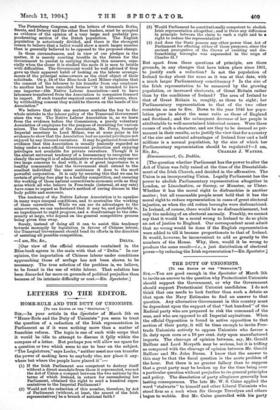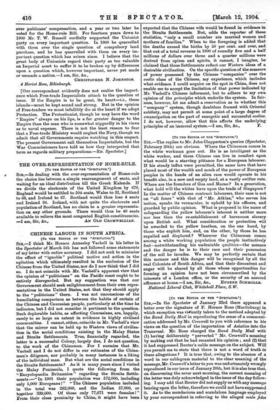THE DUTY OF UNIONISTS.
[TO THE EDITOR OF THE " SPECTATOR."]
SIR,—You are good enough in the Spectator of March 5th to invite an answer to the question why Protectionist Unionists should support the Government, or why the Government should support Protectionist Unionist candidates. I do not think that one needs to look further than such a debate RS that upon the Navy Estimates to find an answer to that question. Any alternative Government in this country must be dependent upon the support of that "lost hundred" of the Radical party who are prepared to risk the command of the seas, and who are opposed to all Imperial aspirations. When the official Opposition is found in active opposition to that section of their party, it will be time enough to invite Free. trade Unionists actively to oppose Unionists who favour a 2s. duty upon corn or a 10 per cent, duty upon manufactured imports. The cleavage of opinion between, say, Mr. Gerald Balfour and Lord Morpeth may be serious, but it is trifling as compared with the cleavage of opinion between Mr. Gerald Balfour and Mr. John Burns. I know that the answer to this may be that the fiscal question is the acute problem of the hour. But there is no greater fallacy than to suppose that a great party may be broken up for the time being over a particular question without prejudice to its general principles and policy. The dissolution of party allegiance generally has lasting consequences. The late Mr. W. S. Caine applied the word " stalwarts " to himself and other Liberal Unionists who stood firm as a rock when Sir George Trevelyan and others began to wobble. But Mr. Caine quarrelled with his party over publicans' compensation, and a year or two later he voted for the Home-rule Bill. For fourteen years down to 1900 Mr. T. W. Russell cordially supported the Unionist party on every important question. In 1900 he quarrelled with them over the single question of compulsory land purchase, and he has quarrelled with them on every im- por taut question which has arisen since. I believe that the great body of Unionists regard their party as too valuable an Imperial asset to suffer it to be broken up by differences upon a question which, however important, never yet made or unmade a nation.—I am, Sir, St.C.,
[Our correspondent evidently does not realise the import- ance which Free-trade Imperialists attach to the question at issue. If the Empire is to be great, its heart—i.e., these islands—must be kept sound and strong. But in the opinion of Free-traders we must infallibly die at the heart if we adopt Protection. The Protectionist, though he may have the word " Empire " always on his lips, is a far greater danger to the Empire than the man who is somewhat niggardly in his views as to naval expense. There is not the least reason to fear that a Free-trade Ministry would neglect the Navy, though we admit that all Governments require watching in this respect. The present Government call themselves Imperialists, but the War Commissioners have told us how they interpreted that term as regards military preparations.—En. Spectator.]











































 Previous page
Previous page